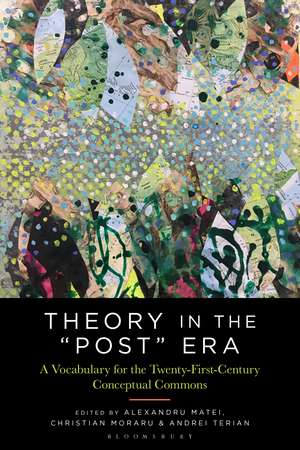Theory in the "Post" Era: A Vocabulary for the 21st-Century Conceptual Commons
Editat de Professor Christian Moraru, Dr. Andrei Terian, Alexandru Mateien Limba Engleză Paperback – 22 mar 2023
| Toate formatele și edițiile | Preț | Express |
|---|---|---|
| Paperback (1) | 194.50 lei 6-8 săpt. | +75.75 lei 6-10 zile |
| Bloomsbury Publishing – 22 mar 2023 | 194.50 lei 6-8 săpt. | +75.75 lei 6-10 zile |
| Hardback (1) | 571.66 lei 6-8 săpt. | |
| Bloomsbury Publishing – 22 sep 2021 | 571.66 lei 6-8 săpt. |
Preț: 194.50 lei
Preț vechi: 251.07 lei
-23% Nou
37.22€ • 40.42$ • 31.27£
Carte tipărită la comandă
Livrare economică 23 aprilie-07 mai
Livrare express 18-22 martie pentru 85.74 lei
Specificații
ISBN-10: 1501381970
Pagini: 376
Dimensiuni: 152 x 229 x 25 mm
Greutate: 0.5 kg
Editura: Bloomsbury Publishing
Colecția Bloomsbury Academic
Locul publicării:New York, United States
Caracteristici
Notă biografică
Cuprins
Recenzii
What Theory in the Post Era, as a collective manifesto - for a new age, a "post" age of literary theory - excels at is finding new and functional alternatives to an otherwise overused and exhausted set of working notion for the study of literary and critical phenomena in and from the margins and deliver them to the world. More than that, there are several concepts introduced for the very first time (at least in a similarly ambitious editorial project) that could feasibly form the basis for a new "communality" in Eastern European literary theory and that could rapidly enter the world theory system.
Even readers annoyed by the proliferation of constructions in "post-" will discover much to engage and provoke in this lively collection by a group of Romanian scholars. Writing from the periphery of Europe yet well-versed in contemporary Western critical thought, they offer original, estranging perspectives on issues of the moment, whether proposing an Easthetics, a Constructuralism, or literary criticism as diplomacy.
Just as there is 'World Literature,' this book urges us to consider 'World Theory.' While we often tout the globalism of theory, its history typically focuses on Western Europe and the US. Reminding us that the story of theory is a travel narrative, this collection features work arising from Romania's Critical Theory Institute, whose members have been investigating the various possibilities of theory in the new millennium. One way to think of theory is as the genre that allows us to speak critically across various national, disciplinary, and temporal borders, and Theory in the 'Post' Era works to create a contemporary intellectual commons.
This group of inspired Romanian 'post' theorists decisively shows two things. First, theory is no thing. You cannot be for or against it. It is rather the ubiquitous fabric of our global conversation on politics, culture, science, and art. Second, theory is no longer (and never really was) an elite discourse promulgated in Paris, New York, New Haven, and Irvine. It is a radically decentered interrogation that is elaborated in both Cluj and Greensboro, in Walla Walla and Taipei. It is alive and well and living on the periphery!
Boldly recasting theory as World Theory, this timely volume makes a compelling case for 'theory commons,' for what we as theorists translate and share as an open-ended, transnational community, a community-needed by theory and in need of theory-invested in thinking inventively and comparatively the plethora of "posts" endemic to our infinitely interconnected planetary condition.
'Romania,' amid the planetary turbulence of 2021, is every bit as a propos as the more customary 'deconstruction' or 'Cultural Studies' in denoting that interstitial zone (or lab) where new modalities of critical reception, theoretical investigation, and cultural mapping, prompted by turbulent developments, get generated. Romanian intellectuals have routinely coped with their country's historical placement in a multicultural 'outskirts' of European culture, with its World War II suppression under Nazism, followed by the singularly cruel abuses and meltdown of its Communist regime. It is no accident that we turn to an 'A-team' of Romanian commentators assembled by the editors of Theory in the 'Post' Era in our own efforts to process distortion effects now entrenched but particularly rampant since 2016, with no end in sight. In treating the periphery as a theoretical phenomenon on a planetary scale in its own right; in registering the inroads made by such factors as science, systems theory, cybernetics, design, geography, and diplomacy into contemporary cultural deliberation, the collective authorship of Theory in the 'Post' Era casts luminous insight on present-day impasses, while crystallizing the vision necessary for addressing the future.
Descriere
Theory in the "Post" Era brings together the work and perspectives of a group of Romanian theorists who discuss the morphings of contemporary theory in what the editors call the "post" era. Since the Cold War's end and especially in the third millennium, theorists have been exploring the aftermath - and sometimes just the "after" - of whole paradigms, the crisis or "passing" of anthropocentrism, the twilight of an entire ontological and cultural "condition," as well as the corresponding rise of an antagonist model, of an "anti," "meta," or "neo" alternative, with examples ranging from "posthumanism" and "post-postmodernism" to "post-aesthetics," "postanalog" interpretation or "digicriticism," "post-presentism," "post-memory," "post-" or "neo-critique," and so forth. It is no coincidence, the contributors to this volume argue, that this "post" moment is also a time when theory is practiced as a world genre. If theory has always been a "worlded" enterprise, a quintessentially communal, cross-cultural and international project, this is truer at present than ever. Perhaps more than other humanist constituencies, today's theorists work and belong in a theory commons that is transnational if still uneven economically, politically, and otherwise. Theory in the "Post" Era reports the results of Romanian theory experiments that join efforts made in other places to foster a theory for the "post" age.


